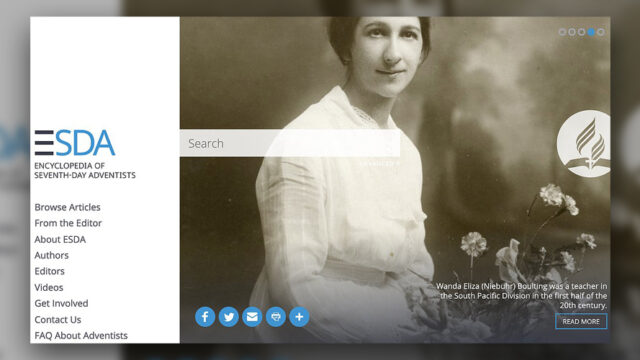Dealing with “difficult” people

When asked, “How do you deal with difficult people?” does a particular person come to mind? My guess is that at least one person does. Dealing with difficult people is an unavoidable part of life, so everyone can benefit by considering this topic. Just think about how different your relationships would be at your home, church, or job if you knew how to deal with difficult people.
Whenever relationships are discussed, it is always important to recognize that one cannot fix or control others. Therefore, this article will focus on what we can control as we explore seven practical steps to deal with difficult people.
1. Self-examine
When dealing with difficult people, one must first look in the mirror and ask, “Am I the difficult person?” According to Pamela Meyer, author and expert on lying, we self-deceive about 10 to 200 times a day!1 We read in Jeremiah 17:9 that “the heart [mind] is deceitful above all things, and desperately wicked; who can know it?” A common form of self-deception is projection. Projection is thinking that others have negative qualities that you yourself have. We may think others are difficult because we have projected our difficulty onto them. As a psychologist, I regularly find my clients projecting. They rant about a spouse, child, coworker, pastor, or even customer service agents they view as difficult, while theyare clearly the one being difficult.
Jesus describes the importance of self-examination in Matthew 7:3: “Why do you look at the speck of sawdust in your brother’s eye and pay no attention to the plank in your own eye?” (NIV). To be more direct: “Why do you label your ‘brother’ as ‘difficult’ and don’t realize that you are being ‘difficult’?” Jesus then admonishes His listeners in verse 5 to “first take the plank out of your own eye, and then you will see clearly to remove the speck from your brother’s eye” (NIV). Work on your difficulty first, and then you can discern others’ difficulties and how to deal with them. Pray Psalm 139:23, 24: “Search me, God, and know my heart; test me and know my anxious thoughts. See if there is any offensive way in me, and lead me in the way everlasting” (NIV).
2. Take Responsibility
People often say, “That person made me angry,” or “They triggered me.” This is not entirely true. They can influence how you feel, but no one can make you feel anything. Instead of blaming others, accept responsibility for your response and then ask, “What in me is triggered by this person?” The most emotionally mature are those who are self-aware and take responsibility for themselves. Even if your judgment of the difficult person is correct, there are things that you can own and change.
When you are triggered, do not give a difficult person power by reacting. Difficult people are powerless without your reaction. When I was young, my older brother would tickle my older sister and me. Because of my sister’s hysterical reaction, he would (you guessed it) tickle her more. Observing this, I denied that I was ticklish when others would ask, or, with every fiber of my being, attempt not to laugh or squirm when they tickled me. By refusing to react, others lost power over me. The same applies to dealing with difficult people. Do not give them power by reacting, whether in the moment or later by dwelling on what they did or venting about it.
3. Redefine “Difficult”
An essential step in dealing with difficult people is removing the “difficult” label you assigned. Labeling is a form of judgment in which we take one characteristic or action of a person and apply it to the whole person. A common label and buzzword today is “narcissist.” People may have traits of narcissism, but to label someone as a “narcissist” portrays them as if this is the entirety of who they are. This is Satan’s agenda, because labels condemn others to the fate of that label and can become a self-fulfilling prophecy. The same applies when we label others as “difficult.” They might think, I’ve been labeled as “difficult,” so why change?
Labels also tend to segregate people based on race (“blacks” versus “whites”), religion (“conservatives” versus “liberals”), political beliefs, and more. Likewise, segregation arises when people label others as “difficult.” We should ask ourselves, What would Jesus do? Jesus fought against alienating labels in His time and saw people’s hearts (see Gal. 3:28).
The value of the prize determines the volume of the pain you are willing to endure.
“The Lord sees not as man sees; man looks on the outward appearance [the difficulties], but the Lord looks on the heart [the deep wounds and brokenness]” (1 Sam. 16:7, RSV;cf. 2 Cor. 5:16).2 Instead of an “us” (the nondifficult) versus “them” (the difficult) mentality, we must realize that we are all “difficult” sinners who have fallen short of His glory (Rom. 3:23), and the same underserved grace we have received we are to extend to others. Let’s be like God and remove the label of “difficult,” starting now. This article will now refer to “difficult people” as people who need extra grace. They are “extra-grace-required people,” or EGRs.
4. Connect and Listen
One major blessing of my job as a psychologist is listening to people’s stories. As I see behind the curtain of their lives, empathy and compassion spring up within me, instead of judgment and frustration. Although you may not have the same opportunity to hear people’s stories daily, everyone can connect, ask, and listen to others. Don’t judge them, but listen and be patient. As James 1:19 says: “Be swift to hear, slow to speak, slow to wrath.”
Bo Bennett, an author on critical thinking, has said, “If you want plenty of experience in dealing with difficult people, then have kids.”3 Like children, EGRs usually have underdeveloped emotional and social skills. Perhaps we need to view EGRs with new eyes, as precious children who need our love and care to continue their development. In God’s eyes we are all children, and He wants the children to come to Him.
Connecting and listening creates not only empathy for the weaknesses of people but also opportunities to perceive their strengths. Jesus recognized both the weaknesses and strengths in people. He had compassion for their brokenness while also cultivating the good in them. We need to do the same for EGRs. Although someone may have interpersonal challenges, they may be gifted in other ways that can further ministry. There is a need for everyone in the body of Christ (see 1 Cor. 12:12-27).
5. Define the Difficulty
As you listen, instead of labeling, you can better define the problem interfering with your relationship. Several things may contribute to problematic interactions. Someone may suffer from a physical or psychological disorder or have a different personality, lifestyle, belief system, or culture than you. By identifying which of these options are causing the difficult interaction, you could then determine an appropriate solution.
Solutions are not one-size-fits-all. There are many variables. Much depends on your relationship with the EGR, whether with a family member, a church member, someone with authority, or a stranger. You should also consider the frequency of your interactions and your objective for the relationship. If the relationship is with a customer service agent you rarely see, and the main objective is to return a purchased item, then your approach would be very different than if the relationship is with your boss, with whom you interact frequently. Last, you need to consider what interactions the EGR is capable of. Are they capable of responding to requested boundaries? Too often people are frustrated at an EGR when it becomes apparent that they are not capable of acting differently. Let people teach you who they are and what they are capable of, and set your expectations accordingly.
6. Set Boundaries
Boundaries are necessary for dealing with EGRs and for all relationships. A great guiding principle for boundaries in the Bible is revealed in God’s character—a balance of justice and mercy (Ps. 85:10; Micah 6:8; Matt. 23:23). Human love is often imbalanced; we tend to emphasize one and neglect the other. When dealing with EGRs, most Christians fall on the side of too much grace (i.e., loose or no boundaries) until they reach their breaking point (“I’ve had enough”) and then swing entirely to justice (i.e., rigid boundaries, such as cutting the person out of their life altogether). Balancing justice and mercy will depend on the person and the situation. Let the Holy Spirit, not your biased judgment, guide you in setting boundaries.
In the same way, we must find a balance between justice and mercy; we are to find a balance in caring for others and ourselves. The guiding principle for this in God’s Word is to love our neighbors as ourselves(Mark 12:31). We cannot love others if we do not love and care for ourselves. Compassion fatigue and burnout are inevitable without regular and routine self-care. Even Jesus needed to set boundaries of self-care when dealing with the EGRs of His time (e.g., argumentative disciples, accusatory leaders, needy broken people, etc.). Jesus often retreated from the multitude to the wilderness (Luke 5:15, 16), the mountainside (Matt. 14:23), or a solitary place (Matt. 14:13; Mark 1:35). He also found refreshment among safe, trusted friends. As Ellen White points out: “Jesus had often found the rest that His weary human nature required at the house of Lazarus, in Bethany.”4 Setting and communicating boundaries is only half the battle. The more challenging half is then enforcing and reinforcing boundaries.5
7. Seek Counsel
Since there is no one-size-fits-all solution for the diversity of EGRs you will encounter, you will need to seek support and counsel. First, seek counsel from God. Through prayer, Bible study, and experience, the Holy Spirit can guide you. Second, seek counsel from objective, trusted individuals.
When I was in seventh grade, my best friend was confiding in me about her mental health issues, including self-harm and suicidal thoughts. She made me promise that I wouldn’t tell a soul. Her struggles weighed so heavily on me that I began to exhibit signs of depression. Taking notice of this, my sister asked me what was wrong. The dam I had held back for so long broke as tears poured down my face. I’ll never forget my sister’s response: “K’dee, you are not responsible for your friend’s struggles and life.” My sister validated my desire to care for my friend while permitting me to set boundaries in caring for myself. It was as if Jesus Himself were speaking to me, saying, “I see your caring heart, K’dee. But I am her Savior, not you. Give her over to Me.” I then shared my friend’s struggles with a trusted adult at school, and not only was a huge weight lifted off my shoulders, but my friend’s needs were better met.
God calls us to help others, but we are not responsible for them. Do what you can, and give the rest to God and others.
My Testimony
In conclusion, I want to share a personal story of the power of utilizing God’s principles to not just deal with but love an EGR.
In high school I was bullied and often a loner. Although these were challenging years, they shaped me to be empathic, and kindled a desire to befriend outcasts. In graduate school I experienced my most challenging friendship with an EGR. The local Adventist community graciously tolerated his presence at social gatherings, but no one wanted to be his friend. I will admit that I even struggled to continue our friendship at times. One day this friend opened up to me about his childhood. He shared the neglect and abandonment he had experienced and how he now purposely tested others to see if they would also abandon him. He said, “K’dee, I know I have tested and pushed you away. And somehow you have never left me. I understand God’s unconditional love more because of your friendship. You have no idea how much it means to me. I’m sorry for being so difficult. I just don’t know how not to push anymore.”
Friendships with EGRs are not easy, but they can be extremely rewarding. I still cherish that dear friend and am thankful for what such relationships have taught me about God and His love for us. My husband often says, “The value of the prize determines the volume of the pain you are willing to endure.” You were worth the pain of the cross. The healing my friend experiences because of God’s love through me is worth the pain of a challenging friendship. I hope you will accept the challenge to love, care, and bring healing to an EGR. May God bless you with the patience, compassion, grace, justice, and love that will equip you to thrive in dealing with and loving EGRs!
1 See Pamela Meyer, Liespotting: Proven Techniques to Detect Deception(New York: St. Martin’s Press, 2011).
2 Bible texts credited to RSV are from the Revised Standard Version of the Bible, copyright © 1946, 1952, 1971, by the Division of Christian Education of the National Council of the Churches of Christ in the U.S.A. Used by permission.
3 See, further, Bo Bennett, Year to Success: When It Comes to Success, There Are No Shortcuts (Sadbury, Mass.: Archieboy Holdings, 2004).
4 Ellen G. White, Daughters of God (Hagerstown, Md.: Review and Herald Pub. Assn., 1998), p. 57. For further insights on self-care in ministry, read the chapter entitled “Danger From Overwork” in Ellen G. White, Gospel Workers (Washington, D.C.: Review and Herald Pub. Assn., 1915), pp. 243-246.
5 For further insights on boundaries, see Henry Cloud and John Townsend, Boundaries: When to Say Yes, How to Say No (Grand Rapids: Zondervan, 2017).








